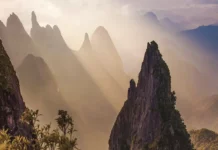The sunrise is but a pale image of the resplendent dawn signified by Mary Most Holy’s appearance on this earth. Blessed the moment when the virginal creature destined to be the Mother of the Saviour came into the world!
The birth of Our Lady brought to humanity something hitherto unknown: a creature free of any stain, a lily of incomparable beauty that was to gladden the angelic choirs and the whole earth. In the midst of the exile of the corrupt human race, an immaculate being appeared, conceived without original sin.
She brought with Her all the natural riches befitting a woman. God gave her a most precious personality and her presence among men represented, also on this account, a truly incalculable treasure.
Now, if we add to the natural gifts the immeasurable treasures of grace that accompanied Her – the greatest ever granted to anyone by Our Lord God – we can gather the enormous significance of her advent in the world. Sunrise is a pale reality in comparison with the resplendent dawn signified by the appearance of Mary Most Holy on this earth!
The most solemn enthronement of a king or a queen, or the natural phenomena of the greatest magnitude are as nothing compared to the birth of the Virgin. At that blessed moment, certainly hailed by the joy of all the Angels of Heaven, we may speculate that upright souls scattered throughout the world felt an unusual surge of jubilation. And this sentiment could well be expressed by a paraphrase of Job’s words:
“Blessed the day that saw Our Lady’s birth, blessed are the stars that looked upon Her when She was little, blessed is the moment when the virginal creature destined to be the Mother of the Saviour came into the world!”
Her coming into the world was the beginning of our redemption
If it is possible to say that the redemption of humanity began with the birth of Our Lord Jesus Christ, the same can be said, respecting due proportions, regarding the Nativity of Our Lady. For everything that the Saviour brought us began with the One who would give Him to the world.
The hopes for salvation, indulgence, reconciliation, pardon and mercy that were opened to humanity on that blessed day when Mary was born in this land of exile are thus understood. A happy and magnificent moment, it marked the beginning of the unfathomably perfect, pure and faithful existence of what was destined to be the greatest glory of all time for the human race, inferior only to Our Lord Jesus Christ, the Incarnate Word of God.
Many theologians maintain that, having been conceived without original sin, Our Lady was endowed with the use of reason from the very first moment of her being. In the womb of St. Anne, where She lived as in a tabernacle, She would therefore already have had the loftiest and most sublime thoughts.
A parallel can be drawn with what Sacred Scripture tells of St. John the Baptist. He, who had been conceived in original sin, when he heard the voice of Our Lady greeting St. Elizabeth, trembled with joy in his mother’s womb.
Therefore, it is possible that the Blessed Virgin, with the sublime knowledge She received by the grace of God, began at once, in her mother’s womb, to ask for the coming of the Messiah, and that in her soul She formed the lofty intention of one day becoming the servant of the Redeemer’s Mother.
In any case, her mere presence on earth was a source of grace for those who approached Her and St. Anne, and it would be even more so after her birth. If from Our Lord’s tunic, as the Gospel tells us, healing powers radiated to those who touched it, how much more from the Mother of God, Chosen Vessel!
Newly-born, and already victorious over the devil

St. Peter’s Cathedral, Condom (France)
If the coming of the Saviour defeated evil in mankind, the Nativity of the Blessed Virgin was accompanied with the light that marked the beginning of the victory of good and the crushing of the devil. Even he realized that something of his sceptre had been irreparably broken. Our Lady was beginning to influence the destiny of humanity.
The world of that time had sunken into the most radical paganism, in a situation very similar to that of our days: vice reigned, the most diverse forms of idolatry dominated the earth, and decadence threatened the Jewish religion itself, a harbinger of Catholicism. Everywhere, error and the devil were victorious.
But at the moment decreed by God in His mercy, He demolished the wall of evil, bringing Our Lady into the world. From the root of Jesse blossomed the divine lily, Our Lord Jesus Christ. With His birth began the irreversible destruction of satan’s reign.
The “birth” of Mary in our spiritual life
Our Lady’s first triumph over evil brings to mind another reflection.
How often in our spiritual life we find ourselves immersed in the struggle against temptations, writhing and reeling in difficulties! And we have no idea when the blessed day will come when a great grace, an outstanding favour, will put an end to our torments and struggles, finally affording us great progress in the practice of virtue.
At that moment there will be a kind of birth of the Blessed Virgin in our souls. She will arise amid the darkness of the greatest trials, overcoming at the very outset the difficulties that we have been facing. She will rise up like a dawn in our existence, representing in our spiritual life a role hitherto unknown to us.
This thought should fill us with joy and hope, giving us the certainty that Our Lady will never abandon us. In the most difficult hours, She, as it were, bursts into our midst, solving our problems, alleviating our sorrows and giving us the combativeness and courage necessary to fulfil our duty completely, however arduous it may be. The greatest consolation She brings us is precisely this strengthening of our will, which allows us to undertake the fight against the enemies of our salvation.
Dawn in the storyline of history
Our Lady also gives us the strength to become zealous children of the Church and defenders of the Catholic religion. There is historical evidence to affirm that all the great souls who have fought against the various heresies over the centuries were especially raised up by Her. This is what the coat of arms of the Claretians so beautifully suggests. In addition to the Immaculate Heart of Mary, it also bears St. Michael the Archangel and the motto: “Her children rose up and called Her Blessed.”
Is not this rising up of the Blessed Virgin’s devotees to glorify Her another a manner of her being born, like a magnificent dawn in the storyline of history?
Thus, the true children of Our Lady must desire and ask of Her the grace to be indomitable and implacable against the devil and his henchmen who, in our days, seek to defile the glory of the immortal Church of Christ. ◊
Taken, with slight adaptations,
from “Dr. Plinio” magazine. São Paulo.
Year II. N.18 (Sept., 1999); p.13-15
The Most Holy Name of Mary
Seek a name for Our Lady that can replace “Mary” and you will not find it. When we glorify this name, we exalt the most profound significance of her person.
The considerations about the name of Mary that we will make today should begin by examining what a person’s name means.
Images of God’s perfection

We know from Sacred Scripture (Gn 2:18-20) that God made all the created animals file before Adam, and he, after observing each one, gave them a name that defined their being and corresponded to the deepest meaning of their nature.
Any animal, however small, is an extremely rich being, because it is alive, moves by itself and, more than that, reflects aspects of God’s infinite perfection.
Take, for example, the eagle. It is proper to this splendid bird to it to display its claws, its great wings, its power and its impetus. However, these attributes symbolize on the physical plane a certain quality of God that its anatomy and physiology combine to express.
Adam, knowing and interpreting these qualities, summed up in the word “eagle” the symbolism of this perfection of the Creator. And thus he did with all the other animals, whose name represents the deepest meaning of this reflection of a specific aspect of God.

Mount Carmel House, Caieiras (SP)
By exalting the name of Mary we give glory to God
If this is the case with animals, with greater reason it is so with Our Lady.
Conceived without original sin, She was called Mary because in Her all the qualities proper to the one destined to be the Mother of the Word of God were harmonized in a supreme degree. Therefore, this name means, in a mysterious way, all the infinitely perfect aspects of God which She represents in such a special way.
It follows that when we exalt the name of Mary, we glorify that most profound significance of her person, and we also glorify God himself in a magnificent way by praising Him in the figure of His most beloved Mother.
Perfect names for Jesus and Mary
Finally, it is fitting to emphasize the wonderful and unfathomable relationship that exists between the name and the person as applied to Jesus and Mary.
Would there be any other name on the face of the earth that could be given to Our Lord? Although, as stated, the question is somewhat unfathomable, from my point of view He could only be called Jesus. Let us imagine that He received one of the names consecrated by great Saints, such as Francis, Anthony, John… They would not fit. His name is Jesus!
The same can be said of Our Lady. Seek a name that can replace hers and you will not find it.

Convent of St. Clare, Guernica (Spain)
The names of Jesus and Mary are mysteriously linked to the deepest sense of the human nature of Our Lord and His Blessed Mother. Together they constitute a beautiful ensemble and when, at the end of a letter, we sign “in Jesu et Maria” — “in Jesus and Mary”, we perceive such an affinity between these two names that it evokes the perfect harmony between two wonderful musical notes.
Reason for the feast of the name of Mary
All this helps us to better understand the reasons that led the Church to institute a liturgical feast for the Most Sacred Name of Jesus, celebrated in January, and another for the Most Holy Name of Mary, on September 12.
As the name is a symbol and definition of the one who possesses it, when the Incarnate Word considers in himself the union of the two natures in one person, or when the Eternal Father or the Divine Holy Spirit consider this union in the Son, the name “Jesus” appears to Them. And when they contemplate Our Lady, the name “Mary” comes to Them. ◊
Taken, with slight adaptations,
from “Dr. Plinio” magazine. São Paulo.
Year XI. N.126 (Sept., 2008); p.24-29







